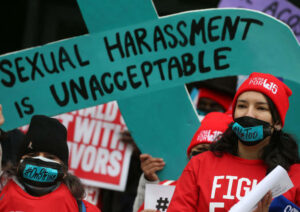
Term victimisation what does it mean
When you hear the term victimisation, you like many others may think it is simply another way of saying bullying or sexual harassment. However, what many do not know is that the definition of victimisation is slightly more nuanced than that. Victimisation is in fact when an employer treats you unfairly, discriminates against you or dismisses you as a result of making a workplace complaint. For example, if you made a complaint about an adverse action like bullying, sexual harassment or discrimination.
If you have been victimised at work, you have the means to stand up for yourself and your rights. There are federal and state laws across Australia that protect workers from victimisation and adverse action. And you have the means to hold those who have victimised you to justice.
How to lodge a victimisation claim
If you have been victimised and experienced adverse action, you can lodge a General Protections claim with the Fair Work Commission. Below, we detail the two types of General Protections claims that you can lodge depending on your circumstances You should lodge this claim if you have experienced victimisation and adverse action but have not been dismissed. To lodge this type of claim, you will need to fill out an F8C Form. You can lodge this claim up to six years after your victimisation and adverse action took place.
This claim is for those who have exercised a workplace right and have experienced adverse action as a result. For example, if you made a complaint to your employer about your working conditions. And subsequently, they changed your position to your detriment. As a remedy for the adverse action taken against you, you can request financial compensation.
General Protections with dismissal claim
You should lodge this claim if your victimisation and adverse action resulted in you being dismissed. To lodge this type of claim, you will need to fill out an F8 Form. There is a much tighter deadline to submit this form. You must do so within 21 days of the date of your dismissal.

The General Protections claim process
The Fair Work Commission will aim to resolve your victimisation and adverse action claim within 6 weeks of receiving your General Protections form. Here is how the process generally works. Once you lodge your claim, the Fair Work Commission will forward it to your employer. They are given the opportunity to respond or object to the claim. They must do this within seven days of receiving it.
If they do not object to the claim on jurisdictional grounds, the Fair Work Commission will organise a conciliation. This typically takes place between five to ten weeks after lodging your claim. The conciliation will be guided by a Fair Work Commission member. Their aim is to foster discussion between you and your employer. You will be given the opportunity to share your side of the story concerning your victimisation and adverse action.
The aim is for both parties to reach a settlement. If the conciliation does not lead to a settlement, the Fair Work Commission will issue a certificate to confirm that the case remains unresolved. At this point, you or your employer can ask the Fair Work Commission to escalate the case to a formal arbitration. Or you can choose to escalate the case to be resolved in a court or tribunal.
Lodging a victimisation complaint via a human rights commission
If you have experienced victimisation and adverse action, there is an alternative to seeking justice via the Fair Work Commission. You can also lodge a claim with the Australian Human Rights Commission. Or with the human rights commission in your state. For instance, the Victorian Equal Opportunity and Human Rights Commission.
Like with the Fair Work Commission, the process of resolving your victimisation and adverse action complaint will involve a conciliation. If you and your employer can not reach a resolution during conciliation, you can make an application to escalate your complaint to be heard in a court or tribunal. It must be noted that the downside to making a complaint through a human rights commission is that the process can take much longer than via the Fair Work Commission.

Examples of victimisation claims
As we mentioned before, both the Fair Work Commission and human rights commissions aim to resolve victimisation and adverse action claims via conciliation. If this is not possible, you have the option to have your claim heard in court or a tribunal. Below, we provide examples of cases that were resolved via tribunal.
Kitchen hand wins $6,000 for victimisation and sexual harassment
In the case McGuire v Reyes t/as The Entrance Lakehouse [2017] NSWCATAD50, a worker accused a male colleague of sexual harassment. She claimed that she had been victimised as she had been dismissed for complaining about the sexual harassment. The case was heard by the NSW Civil and Administrative Tribunal.
Lynn McGuire worked as a kitchen hand at The Entrance Lakehouse on the New South Wales Central Coast. Laurie Spooner served as the Operations Manager at the same establishment. Ms McGuire claimed that Mr Spooner had subjected her to unwelcome sexual advances at work between 11 March and 26 June of 2015.
She alleged that Mr Spooner had hugged her around the neck without her consent. And on two occasions, touched her buttocks and genital area while she was on a step ladder. Ms McGuire also claimed that she had been victimised by Maria Reyes after she reported the harassment. She believed that she had been dismissed by Ms Reyes due to her complaint. In August 2015, Ms McGuire made a sexual harassment and victimisation complaint with the NSW Anti-Discrimination Board.
NSW Civil and Administrative Tribunal rules on the victimisation case
The Anti-Discrimination Board investigated Ms McGuire’s case but could not reach a resolution. It was then referred to the NSW Civil and Administrative Tribunal to investigate further. The burden of proof in civil proceedings such as this requires the applicant to establish their case on the balance of probabilities. This means that it was Ms McGuire’s responsibility to show that it was more likely than not that the alleged events occurred as claimed.
The central issue of this case revolved around whether Mr Spooner’s actions constituted unwelcome sexual advances. Ms McGuire asserted that Mr Spooner’s conduct, including hugging and touching her, was of a sexual nature and made her uncomfortable. In contrast, Mr Spooner contended that his actions were not sexually motivated but were meant to ensure workplace safety.
The NSW Civil and Administrative Tribunal found Ms McGuire’s account of the incidents to be consistent and plausible. She argued that she did not report the harassment earlier due to fear of losing her job, which highlighted her vulnerability. In contrast, Mr Spooner’s testimony was found to be inconsistent, and some of his statements appeared self-serving.

NSW Civil and Administrative Tribunal awards Ms McGuire compensation
The NSW Civil and Administrative Tribunal found that there was insufficient evidence to support Ms McGuire’s claim that Mr Spooner had touched her buttocks on a step ladder. However, it did find that the separate incident where Mr Spooner touched Ms McGuire’s buttocks constituted sexual harassment.
The Tribunal concluded that the act was unwelcome and sexual in nature. And as per evidence provided by Ms McGuire, it was accepted that she had shouted “For Christ’s sake, Laurie!” so that others in the kitchen would know she was “just fed up and upset.”
Consequently, the Tribunal held that a reasonable person, considering all the circumstances, would anticipate that Ms McGuire would be offended. That she was humiliated or intimidated. As a remedy, the Tribunal awarded Ms McGuire $6,000 in compensation for the distress and humiliation she endured as a result of the harassment.
Production worker wins $53,000 for victimisation sexual harassment and discrimination
In the case Kumari v Bervar Pty Ltd (Human Rights) [2023] VCAT 21, a production worker for a pizza manufacturer who had experienced sexual harassment, racial discrimination and victimisation. The case was heard by the Victorian Civil and Administrative Tribunal.
Sudesh Kumari had made a complaint to the Victorian Human Rights and Equal Opportunity Commission. In the complaint, she had detailed a number of dehumanising experiences while working at Bervar Pty Ltd, trading as Della Rosa Fresh Foods. She contended that these amounted to violation of the Equal Opportunity Act 2010 (Vic). This included:
- Sexual harassment by a fellow employee who consistently made the applicant uncomfortable by staring at her breasts during conversations.
- Racial discrimination by the immediate manager, who expressed negative sentiments toward the applicant’s Indian heritage, saying, “You are Indian; I don’t like Indians, they always cause problems.”
- Sex discrimination by both the manager and the company’s director during the investigation of the sexual harassment complaint, treating the applicant unfairly.
- Victimisation when the employer directed the applicant to take annual leave as a response to her complaint about sexual harassment.
- Unfavourable treatment by transferring the applicant to a different workplace solely because she had lodged a complaint, and neglecting to inform her of the transfer until the morning of her return to work.

Victorian Civil and Administrative Tribunal rules on the victimisation case
After assessing the evidence provided by both parties, the Victorian Civil and Administrative Tribunal delivered rulings heavily in favour of Ms Kumari.
The Tribunal rejected Della Rosa’s claim that Ms Kumari’s colleague did not stare at her beasts. It accepted Ms Kumari’s uncontested evidence that she was subjected to such inappropriate behaviour. The Tribunal acknowledged that Ms Kumari’s feelings of discomfort, objectification and degradation were entirely valid.
With regard to the racial discrimination Ms Kumari suffered, Della Rosa argued that it was mitigated her preference for remaining in the workplace. However, the Tribunal stated that racially discriminatory comments have no place in the workplace. And that even a single comment, especially coming from a direct supervisor, can have profound effects. The Tribunal also found that Ms Kumari was victimised by being forced to take leave after she reported the sexual harassment. This action left her feeling punished, distressed and anxious about her financial stability.
In addition, the Victorian Civil and Administrative Tribunal:
- Rejected Della Rosa’s argument that Ms Kumari had not been treated unfairly when she made her sexual harassment complaint. It was accepted that this discrimination during the investigation caused her immense humiliation, distress and a significant loss of enjoyment in life.
- Found that Ms Kumari was subjected to unfavourable treatment when she was abruptly informed of her workplace transfer on the morning she was due to return to work.
Ms Kumari is awarded $53,000 for victimisation and sexual harassment
When determining the appropriate compensation, the Victorian Civil and Administrative Tribunal considered several factors. It took into account that Della Rosa’s actions exacerbated the impact of sexual harassment on Ms Kumari. This included the fact that the she was summoned to the director’s office immediately after filing her complaint, while the employee responsible for harassment was not. Additionally, the manager’s dismissive comments conveyed disbelief and trivialised the complaint.
The Tribunal highlighted Della Rosa’s obligation to provide a safe workplace, free from sexual harassment and discrimination. It also stressed the importance of fair investigation procedures for workplace complaints. The Tribunal emphasised that all Victorian employers have a duty to take reasonable and proportionate measures to eliminate discrimination, sexual harassment or victimisation.
In the end, the Tribunal ordered the Della Rosa to pay the Ms Kumari $53,241 in compensation. This comprised of $38,000 for non-economic loss and $15,241 for economic loss.

Victimisation: How can I lodge a claim? Have you experienced victimisation?
A Whole New Approach can help you take action via the Fair Work Commisssion. We are not lawyers, nor do we want to be. We are experts in helping workers who have been victimised, unfairly dismissed or harassed at work. Over the past three decades, we have empowered more than 16,000 Australian employees to take action through the Fair Work Commission.
Our deep understanding of the system and its regulations enables us to quickly evaluate the merits of your case and provide guidance on the best course of action. Suffering workplace harassment or a forced resignation because of your employers actions call us immediatly. We work on a national basis, including, Victoria, NSW, QLD.
We offer a no-win, no-fee service. And your initial consultation with us is complimentary. Don’t hesitate to contact us today at 1800 333 666 to access the support and expertise you need.
Articles similar to: Victimisation: How can I lodge a claim?
Can an employee be dismissed for expressing a political opinion






